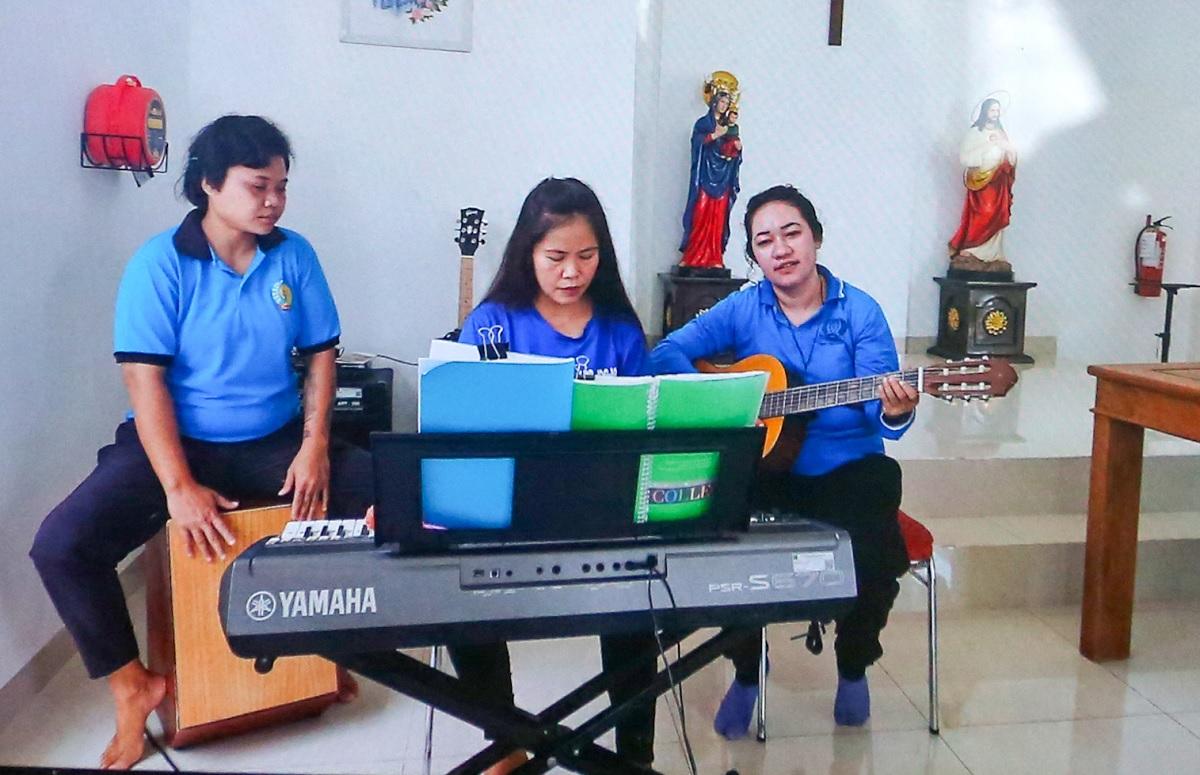Table of Contents
- 0.1 A Journey Through Despair
- 0.2 Long Negotiations and Government Support
- 0.3 Utilizing Skills Learned in Prison
- 0.4 The Broader Context and Impact
- 0.5 Voices of Advocacy Surrounding Veloso’s Case
- 0.6 An Ongoing Conversation
- 1 **To what extent did international pressure and diplomatic efforts contribute to Mary Jane Veloso’s release, and how might this case influence future negotiations involving Filipinos facing similar legal challenges abroad?**
Headline: Filipino Death Row Inmate Mary Jane Veloso to Return Home
Mary Jane Veloso, a Filipino woman who has been sentenced to death in Indonesia, expressed her joy this week after a landmark agreement was reached allowing her to return to the Philippines. Her case, marked by allegations of innocence and external manipulation, will finally culminate in her upcoming transfer home after years of complex negotiations between the two nations.
A Journey Through Despair
Mary Jane Veloso was arrested in Indonesia in 2010 when authorities discovered 2.6 kilograms (5.7 pounds) of heroin hidden in a suitcase she was carrying. The mother of two was subsequently sentenced to death by firing squad, a sentence that sparked outrage within the Philippines. The public and her family vehemently argued that she was an unsuspecting victim of an international drug syndicate, having been lured under the false pretense of a job as a domestic worker abroad.
“I am very elated to hear there is an opening chance for my hope to return home and be with my family,” Veloso stated through a written message read by prison warden Evi Loliancy during a press conference held in Wonosari, Yogyakarta, on November 21, 2024. “I’m grateful and would like to thank everybody who keeps making efforts so I can return to my country,” she asserted, signaling a blend of relief and hope as the holiday season approaches.
Long Negotiations and Government Support
President Ferdinand "Bongbong" Marcos Jr. announced on November 20 that Mary Jane Veloso would be handed over to the Philippines following years of “long and difficult” negotiations with Indonesian authorities. The negotiations gained momentum in recent years, especially after a woman suspected of recruiting Veloso was arrested in 2015 on charges of human trafficking. Veloso’s case took a different trajectory during this judicial process, as she was called as a prosecution witness.
Indonesia’s Law and Human Rights Minister Yusril Ihza Mahendra confirmed that President Prabowo Subianto had approved the transfer, which is expected to take place next month. The Filipino government has been instrumental in pushing for Veloso’s release, emphasizing the importance of her story within the broader context of human rights and international drug laws.
Utilizing Skills Learned in Prison
Upon her return, Veloso has plans to support herself and her family using skills she acquired while incarcerated. She mentioned local cloth-dying techniques as a potential means of earning income, showcasing her resilience and determination to rebuild her life.
The Broader Context and Impact
Mary Jane Veloso’s situation sheds light on a deeper issue concerning the lives of Overseas Filipino Workers (OFWs) who often fall victim to exploitation and human trafficking. Her story resonates with many who face similar hardships, highlighting the desperate circumstances that drive individuals to make risky choices in search of a better life.
This case has not only affected Veloso and her family but also spurred discussions on the challenges faced by Filipino workers abroad and the urgent need for protective measures. Experts in international law and human rights view her impending return as a significant step towards addressing the injustices faced by vulnerable populations.
Voices of Advocacy Surrounding Veloso’s Case
President Marcos expressed gratitude towards Indonesian officials for recognizing Veloso’s plight. He noted, “Her story resonates with many: a mother trapped by the grip of poverty, who made one desperate choice that altered the course of her life.” Supporters both in the Philippines and internationally have rallied for her case, promoting awareness regarding the complex interplay of poverty, labor rights, and the penalties associated with drug-related offenses worldwide.
An Ongoing Conversation
As the Filipino community prepares to welcome Mary Jane Veloso back home, many anticipate not just a family’s reunion but a broader conversation about the issues faced by OFWs. Advocacy groups and governments alike must work together to ensure that no family has to endure sorrow and injustice in the future.
The unfolding story invites reflection on the intersections of poverty, justice, and humane treatment of individuals ensnared in legal battles abroad. Community members are encouraged to share their thoughts and experiences, fostering a dialogue on how to best support individuals like Mary Jane Veloso who have encountered dire circumstances far from their homes.
For more information on Mary Jane Veloso’s story and updates on her return, please visit [Shorty-News](insert link), or check out authoritative sources such as TechCrunch or Wired.
Your thoughts on this evolving situation are welcome—please share your comments and engage with others in the community!
**To what extent did international pressure and diplomatic efforts contribute to Mary Jane Veloso’s release, and how might this case influence future negotiations involving Filipinos facing similar legal challenges abroad?**
## Welcome Back Home: A World Today News Interview
**Opening:**
Today on **World Today News**, we discuss the homecoming of Mary Jane Veloso, a Filipino woman sentenced to death in Indonesia, who is finally returning home after 14 years. We are joined by two distinguished guests:
* **Dr. Emilia Santos**: A leading expert on human rights law and international relations, with a focus on Southeast Asia.
* **Mr. Ramon Reyes**: A Filipino community leader and advocate for Overseas Filipino Workers (OFWs).
Welcome to both of you.
**Section 1: Justice Delayed, Justice Served?**
* **Interviewer:** Dr. Santos, this case has been incredibly complex and drawn out. What were the key obstacles in securing Mary Jane Veloso’s release?
* **Dr. Santos:**
* **Interviewer:** Mr. Reyes, for the Filipino community, Mary Jane’s case has become a symbol. What does her return represent for many OFWs and their families?
* **Mr. Reyes:**
**Section 2: The Complexities of International Drug Laws and Human Trafficking**
* **Interviewer:** Dr. Santos, the intersection of drug trafficking and human trafficking in this case is particularly troubling. How can international legal frameworks be strengthened to protect individuals like Mary Jane who are vulnerable to exploitation?
* **Dr. Santos:**
* **Interviewer:** Mr. Reyes, what are some of the systemic challenges faced by OFWs that make them susceptible to being trapped in situations like Mary Jane’s? How can we address these root causes?
* **Mr. Reyes:**
**Section 3: Mary Jane’s Future and the Broader Impact of Her Story**
* **Interviewer:** Mary Jane has spoken of her resilience and plans to utilize skills learned in prison to support herself. Mr. Reyes, how can the Filipino community best support her reintegration into society?
* **Mr. Reyes:**
* **Interviewer:** Dr. Santos, this case has arguably sparked a conversation about the human cost of international drug policy. What lessons should be learned from Mary Jane’s story, and how can it drive positive change in the future?
* **Dr. Santos:**
**Section 4: Looking Ahead: Protecting Future Generations of OFWs**
* **Interviewer:** Mr. Reyes, what specific steps can be taken by governments and advocacy groups to ensure that Mary Jane’s ordeal is not repeated? What support systems are needed for OFWs to protect themselves from exploitation?
* **Mr. Reyes:**
**Concluding Remarks:**
* **Interviewer**: Thank you both for sharing your invaluable insights. Mary Jane Veloso’s story is a poignant reminder of the struggles faced by OFWs and the need for collective action to safeguard their rights and well-being.
As Mary Jane intricate
steps towards a brighter future. Let’s hope her story inspires continued dialogues and tangible solutions to create a more just and equitable world for all.


